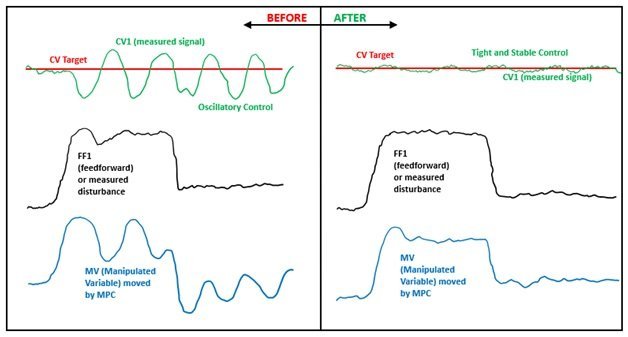Model predictive control (MPC) is a type of advanced process control used to control process variables and optimize performance. MPC uses mathematical models of the process to predict future behavior and then adjusts the process accordingly. This makes it very powerful and practical but complex and challenging to implement.
The Many Uses of Model Predictive Control:
Model predictive control (MPC) is a well-established technique with many applications. It has been used extensively in process control applications such as petroleum refining, ethylene production, and power generation.
PID controllers are tuned based on experience and trial-and-error, while MPC controllers use an explicit model of the process to be controlled. This model is used to predict the future behavior of the process and is horrendous for computing the optimal control signal.
In these cases, MPC could provide better performance than traditional PID controllers.
MPC has recently been applied to automotive systems such as anti-lock braking and electronic stability control. It is attractive for automotive applications because it can deal with system constraints (e.g., the maximum deceleration you can achieve without skidding) and can be implemented in a decentralized way that is robust to sensor failures.
Applications of Model Predictive Control:
MPC has been used extensively in different types of application domains, some of which are listed below:
- Chemical processes
- Electrical circuits
- Overhead cranes
- Robot manipulators
- Aircrafts
- Building heating, ventilation, and air conditioning (HVAC)
- Automotive systems include anti-lock braking systems (ABS) and electronic stability control (ESC).
Traffic Control Systems
Some examples where model predictive control has an advantage over other techniques are controlling processes with strong constraints like anti-skid brakes need very precise deceleration. Other examples are processes with time-varying set points or multivariable interactions like aircraft autopilot or robot arms.
In all these examples, an accurate model is necessary for successful implementation, but MPC outperforms other techniques once obtained.
Model predictive control is a powerful technique with many potential uses. While it requires an accurate system model to be controlled, it can provide better performance than traditional PID controllers in many applications.
The future of Model Predictive Control:
A lot has been said about it in the past few years. Some say it is the future of process control, while others claim it is nothing more than a fad. So, what is the truth? Is MPC the way of the future, or is it just a passing trend?
The answer, quite simply, is that MPC is here to stay. While it is true that it has only recently begun to be widely used in industry, the fact is that it offers many advantages over traditional control methods.
Perhaps the most important of these is that you can use it to optimize both steady-state and dynamic processes. In addition, MPC is not limited to linear methods; you can also use it to manage nonlinear processes.
Another advantage of MPC is that it can be used to deal with process constraints. With MPC, you can optimize multiple variables simultaneously while considering process constraints. This is a significant advantage over traditional PID control, which can only be used to optimize one variable at a time.
Hence, MPC is an ideal choice for applications where you must control multiple variables, such as in batch processes or when interacting processes exist.
In conclusion, MPC is here to stay. With its ability to optimize both steady-state and dynamic processes, as well as its ability to deal with process constraints, it offers several advantages over traditional control methods. This is worth considering if you are looking for a way to improve your process control.
Why Model Predictive Control is an Essential Tool for Process Automation
As industries move towards greater process automation, the need for reliable and accurate control systems rises. In many cases, traditional PID controllers are not up to the task of providing the level of control required. It is where Model Predictive Control (MPC) comes in. People know this potent tool can provide the high accuracy and power needed for many industrial processes.
How Does Model Predictive Control Work?
MPC involves four main steps: model development, model identification, model verification, and controller design. Different people or teams often perform these steps, although it is not uncommon for one person to complete all four stages.
- The first step, model development, is when the mathematical model of the process is created. This model will predict how the process will respond to various inputs.
- The second step, model identification, is when system parameters such as gain and time constant are determined from experimental data.
- The third step, model verification, is verifying the model’s accuracy through comparisons with real-world data.
- The fourth and final step, controller design, is when the actual MPC algorithm is designed and implemented.
Model predictive control is ideal for optimizing complex processes. A high-level overview of MPC introduces some of the key concepts and terminology you need to know before starting with MPC.
Therefore, when you require model predictive control for your purpose, you must know that it is a powerful tool that provides many advantages over traditional PID controllers.
Consider using it if you are looking for a more accurate and flexible way to control your process. MPC can provide reliable and efficient control for even the most complicated industrial processes with its ability to take into account constraints and handle multiple input-output channels simultaneously.
You may consider Pi Control Solutions as your destination when it comes to asking for assistance from an expert. They are industry leaders and are available at your service. Please visit https://www.picontrolsolutions.com/ or call us at (832) 495-6436 for support.








Leave a Reply